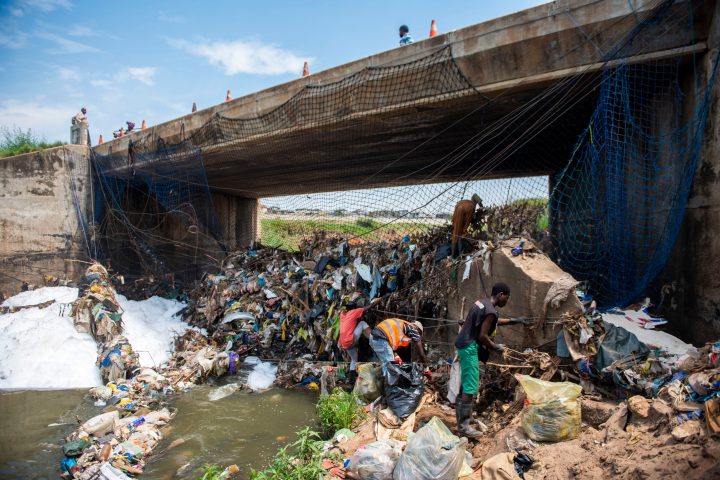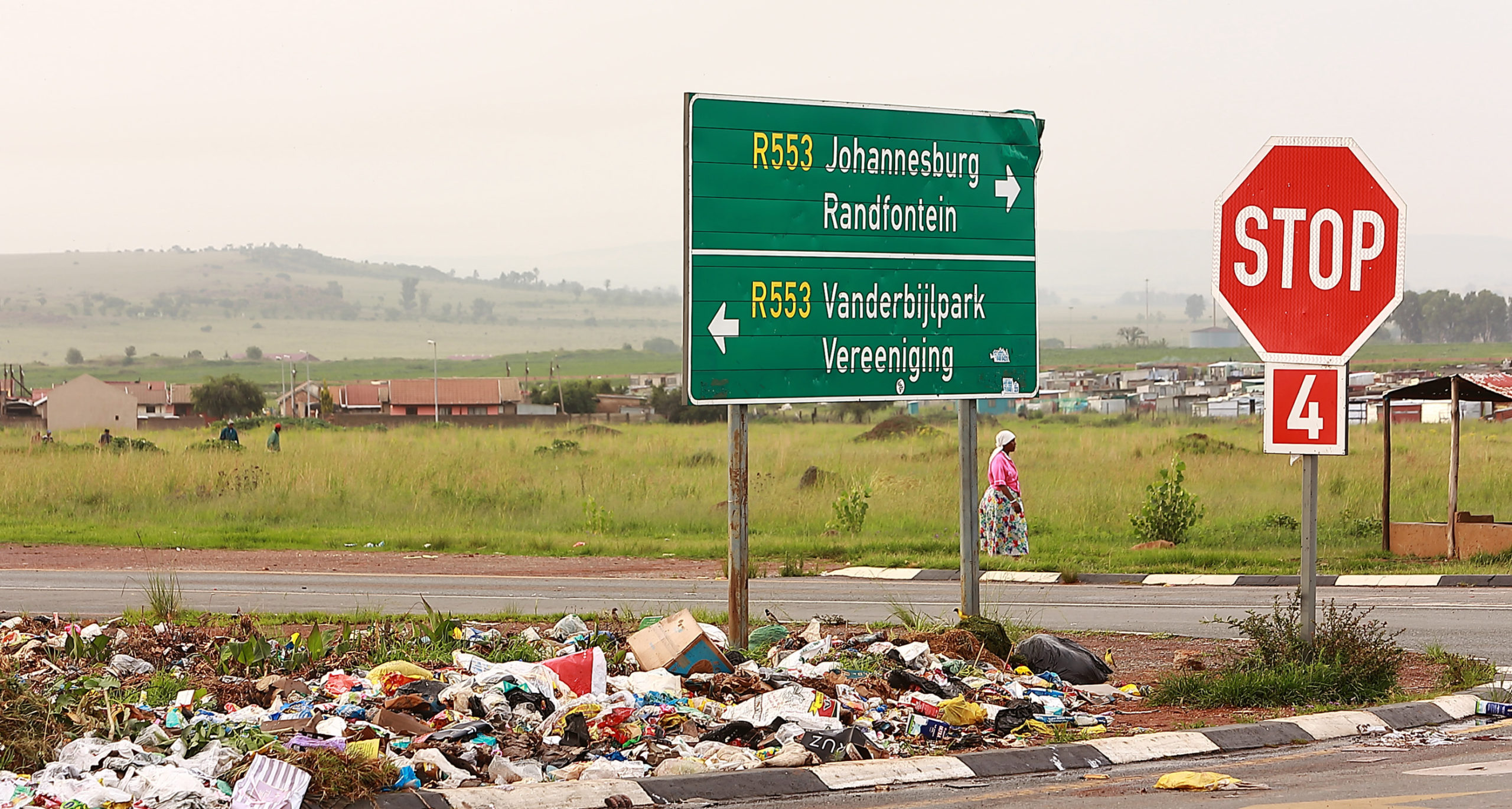OUR BURNING PLANET
Gauteng Quality of Life Survey: Informal settlements are hit the hardest by effects of climate change

Climate scientists have been warning us for years there will be repercussions from global warming and climate change. Now, the new Quality of Life Survey illustrates the real and immediate effects of how people are being affected.
The sixth Quality of Life Survey was released on Thursday by the Gauteng City-Region Observatory and documents the lived experiences of 13,616 Gauteng residents collected between late 2020 and early 2021.
GCRO Quality of Life Survey Report
Gillian Maree, a senior researcher at the Gauteng City-Region Observatory, authored the section that recorded residents’ quality of life in relation to the environment around them and their ability to shield themselves from its negative impacts (Section 11).
Maree told Daily Maverick: “What’s really interesting is I think this is one of the few surveys I’ve seen where we’re actually asking about household experiences with weather, instead of what climate studies typically do – asking the specialists, you know, the climatologist and the hydrologist – about impacts.
“We’re asking for actual lived experiences. And I think, you know, stuff like lightning and heat did take me a little bit by surprise.”
The Observatory completed a targeted geographical sampling between October 2020 and May 2021 – of 13,616 residents across all 529 wards of Gauteng, thus reflecting a range of income groups, races and livelihoods.
A key finding from the report was that a third of all respondents said that environmental factors harmed them or their families.
“That’s a lot!” expresses Maree. “If there’s, what, 15.8 million people in Gauteng, according to the latest stats of household data, that’s nearly five million people saying that their environment has caused them harm. And it’s not decreasing – that’s the important point, it’s staying consistent.”

The Soweto Cleana Day Campaign on 12 June 2021 was run with the theme, ‘No To Pollution and No To Litter’. (Photo: Gallo Images/Fani Mahuntsi)
What has been consistent through the past three Quality of Life Surveys (over the past six years), is that a third of respondents reported that they or their families have been harmed by environmental factors such as air and water pollution.
Maree adds: “A third of people saying that they are affected is significant because that would have knock-on effects, say, for health, for wellbeing, for expenditure on their home if it’s been damaged, and so on.”
Informal settlements hit the hardest
The survey found that informal settlements are more likely to be damaged by extreme events than formal settlements, particularly from extreme events such as fires and flooding.
“Informal areas are more than twice as likely to be impacted by flooding than formal areas,” says Maree, “because they are far more likely to be located in peripheral, low-lying areas where there’s floodplains, and wetlands.

Rubbish piles up on the street in Sebokeng, Gauteng on 13 January 2021 amid reports of a lack of service delivery in many local townships. (Photo: Gallo Images/Fani Mahuntsi)
“But also they won’t have formal protective infrastructure, right, so there’s no attenuation of water. So, if you have an extreme rainfall event when there’s lots of water, there’s nothing there to protect those shacks.”
Informal dwellings are nearly three times more likely to experience fires. Maree says they don’t yet know whether they are caused by humans or nature, “but certainly the way informal settlements are constructed, the type of energy sources that they can afford, does make them more prone to fire, particularly in winter”.
Additionally, the survey found that unlike many formal dwellings, which are built to withstand natural events and protect occupants from their effects, many respondents who live in informal dwellings reported injury or damage from an extreme natural event.
Things are heating up
The most common extreme environmental impacts reported were lightning storms (42% of households), heat (39%) and hailstorms (25%).
However, Maree says heat was the most shocking finding for her.
“I was surprised by the heat. I mean, it’s two out of every five respondents. That’s a large number of people and our climate will get warmer, so those numbers will increase.”
Maree had assumed the more visible effects like flooding would be higher than heat.
“Heat is an interesting one because it’s likely to impact us at an individual level – with regard to our health, particularly the vulnerable like the elderly, who struggle to deal with health.
“And then during periods of heatwaves, we are likely to see, for example, pressure on hospitals, we may see increasing disease vectors. There are studies around the world that point to an increasing number of lost workdays when people are struggling with heat stress. There’s also infrastructure costs, to roads and infrastructure that are not able to cope with the high temperatures.”
Coleen Vogel and Francois Engelbrecht, climatology experts who are part of the Global Change Institute at Wits University, told Daily Maverick: “Heatwaves and periods of extreme heat can negatively impact on people and can lead to heat dizziness, headaches and fainting. Oppressive temperatures can also result in heatstroke, organ damage and unconsciousness. The worst case is heat-related deaths. If accompanied by high humidity this can aggravate issues. Heatwaves can also negatively impact livelihoods – e.g. farming, water access and supply.”
Additionally, Maree points out that all extreme events such as flooding and hailstorms will manifest at an individual and community level.
In terms of the individual, “they may impact on incomes where people are spending money to repair damaged homes after an extreme event, or to deal with injuries. Some of these even cause death in the case of flooding or lightning.”
In terms of community, there is damage to infrastructure and pressure on hospitals and emergency services.
“So it’s pointing to almost a whole-of-the-city approach, where these things impact us from an individual to a whole system that we need to consider.
“And I think that’s the nature of climate change, right. And it’s what we’re really waking up to now, how all-encompassing some of these impacts are if we don’t start trying to protect ourselves.”
Climate change
The survey found that climate change is likely to increase the number of extreme weather events and disasters in Gauteng.
Professor Vogel and Engelberight are both contributing authors to several International Panel on Climate Change (IPCC) reports, including the most recent report and the Special Report on Global Warming of 1.5ºC in 2018.
They explained how the global warming we’re experiencing now is not part of Earth’s natural cycle, and therefore is not something we can dismiss.
“The recently published IPCC Assessment Report Six Working Group I report gives the best estimate of global warming to date – the value of 1.1 degrees Celsius above pre-industrial (1850-1900) levels.
“This is likely the warmest Earth has been in 125,000 years. It is possible that during the Last Interglacial, about 125,000 years ago, Earth was warmer. Such past periods of higher temperatures were caused by slow changes in the orbital characteristics of Earth, occurring over tens of thousands of years. The warming that has occurred since the pre-industrial era is rapid, and cannot be explained by any natural process, including slow orbital changes or changes in solar activity (no systematic trends in incoming solar radiation that can explain the warming since the pre-industrial era).
“Global warming since the pre-industrial era is thus unequivocally the consequence of human activities, specifically the release of greenhouse gasses such as carbon dioxide into the atmosphere, through the burning of fossil fuels… these changes are also directly attributable to global warming and the underlying human-induced causes of global warming.”
“So, the climate change studies are telling us that our climate is going to get warmer,” says Maree. “What this survey does is it help us understand what households are experiencing now, already, in 2020.
“And I think what’s significant there is that two out of five households are already saying that they’re experiencing heat, hailstorms, and severe wind and flooding.
“And that, I think, talks to helping us understand what climate proofing means in this part of the world – so, what is it that’s worrying people? What is it that’s causing harm and damage? And then, how do we build our cities better to be able to cope with even more change that is coming our way?”

Families along the Jukskei River in the Alexandra’s Stjwetla informal settlement live in fear as heavy rains in Gauteng continue on 2 February 2021. (Photo: Gallo Images/Sharon Seretlo)
Vogel and Engelbrecht explain that, according to the science, southern African areas have been warming at twice the global average, and that further drastic warming is projected in the region for as long as global warming continues.
“This regional warming will be accompanied by more frequent and intense heatwaves, increasingly impacting on human comfort, health and mortality. Over the next 20 years it is likely that heatwaves of unprecedented intensity and duration will occur in southern Africa.”
Thus, as Maree points out, what we need to do is develop a heatwave plan and strategy.
“Develop an effective alert or warning system; ensure that an effective communication system is in place – particularly to reach vulnerable groups; ensuring that medical and other facilities are adapted and can manage peak heatwaves; ensuring that we design buildings [as well as transport infrastructure and services, etc] with heatwaves and future heat stress moving forward,” explain Vogel and Engelbrecht.
Everyone is affected
Informal settlements will continue to be hit hardest by the effects of climate change, although every one of us will be affected in our lifetime.
“The interesting thing as well and what struck me about some of the [Quality of Life] data, is not where the exceptions are, but what we have in common,” reflects Maree. “The most common events, particularly heat and lightning, get experienced by everyone, and pretty much everywhere.
“There’s the climate change argument – that it’s more of a universal impact. And must require more universal interventions.” DM/OBP





















 Become an Insider
Become an Insider
Comments - Please login in order to comment.